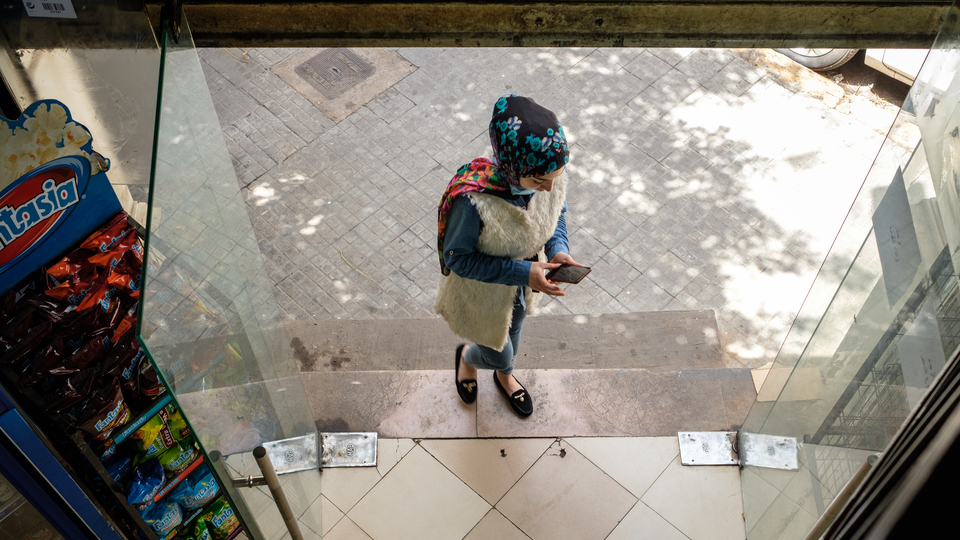“We All Benefit”: On the Little Dikkeneh Co-op That Could
“I remember that during the civil war, my parents often talked about co-ops; they had a membership card,” Nadine Moawad, a longtime feminist activist and co-founder of dikkeneh consumer cooperative, told The Public Source, as she recalled a memory from her childhood. At the time, many households across the country were members of community-owned cooperatives, even cooperative networks, that alleviated daily economic hardships.
The economic collapse over the last two years in Lebanon has reminded people of the civil war: the Lebanese pound is plummeting once again; long power outages across the country are the new norm; and the spiraling queues at supermarkets and gas stations in the pursuit of exorbitantly priced imported necessities in ever dwindling supply have become scenes of everyday life.
On August 4, 2020, a year into the economic crisis, and shortly before the blast ripped through Beirut, Nadine Moawad and Mohamad Ali Katanji picked up the keys to two storefronts in the neighborhood of Basta al-Tahta. Just moments after the co-founders locked up and drove away, the explosion destroyed the glass storefronts and delayed their plan to start a co-op.
By the end of October, they had made the necessary repairs and merged the two stores into the “Dikkeneh Co-op,” a consumer cooperative, launching operations with a small team of five. Today, they have more than 100 members who pay as little as 5,000 Lebanese pounds in monthly dues to purchase foodstuff and other goods at cost.
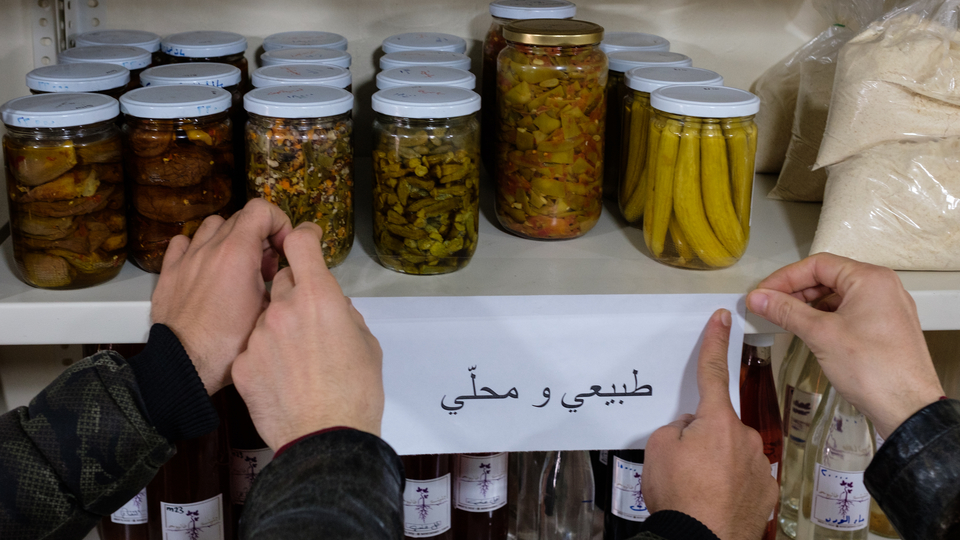
Shopkeepers hang a sign for "natural and local" pickled items. April 16, 2021. (Rita Kabalan/The Public Source)
In this free-falling economy, the store's co-founders say it is imperative to develop innovative cooperative working models that facilitate communal participation in the economy and equitable wealth creation and distribution.
Cooperatives are solidarity economy enterprises that are owned, governed, and run by their members. They aim to meet the common economic, social, and cultural needs of the community and create a space where people can work together democratically.
Maher Abou Shackra, a researcher, organizer, and member of Daleel Tadamon, an NGO that maps, connects, and supports different solidarity enterprises and collectives, defines solidarity economy as a “third sector” in which “economic activities and projects are founded on the principle of solidarity." People-owned, this sector is "independent from the public sector, and its principles and management differ from the private sector’s dominant paradigm of making profits and wealth accumulation. It is a different culture.”
And it is this culture that the dikkeneh is nurturing.
“We want to provide low prices, so people can afford their necessities, and to pressure other stores that are trying to exploit the crisis into competing with our prices,” said Karim Hakim, the operations manager.
"[In co-ops] people have power over their resources, assets, and labor. And it makes a difference." —Dana Abed, researcherA co-op is a “good model that comes from the community and really involves everyone. People have power over their resources, assets, and labor. And it makes a difference,” Dana Abed, a researcher at Oxfam, told The Public Source. Last April, she moderated a panel discussion on international cooperatives at “The Democratic Economy” conference.
There are cooperatives for different economies, including farming, production, retail, housing, craftsmanship, and consumers. “Co-ops are not a new concept in Lebanon, but they’re picking up some popularity after the economic crisis and everything that we have been going through,” according to Abed.
In fact, the inspiration for the dikkeneh comes from the cooperative model that was prevalent in Lebanon in the 1970s and 1980s. Then, many cooperatives were agricultural, formed by farmers who collectively negotiated retail prices and the cost of materials. Consumer cooperatives were also popular and were established by families who paid member dues or acquired stocks in local stores. In exchange, they had a say in the selection of products and benefited from lower prices.
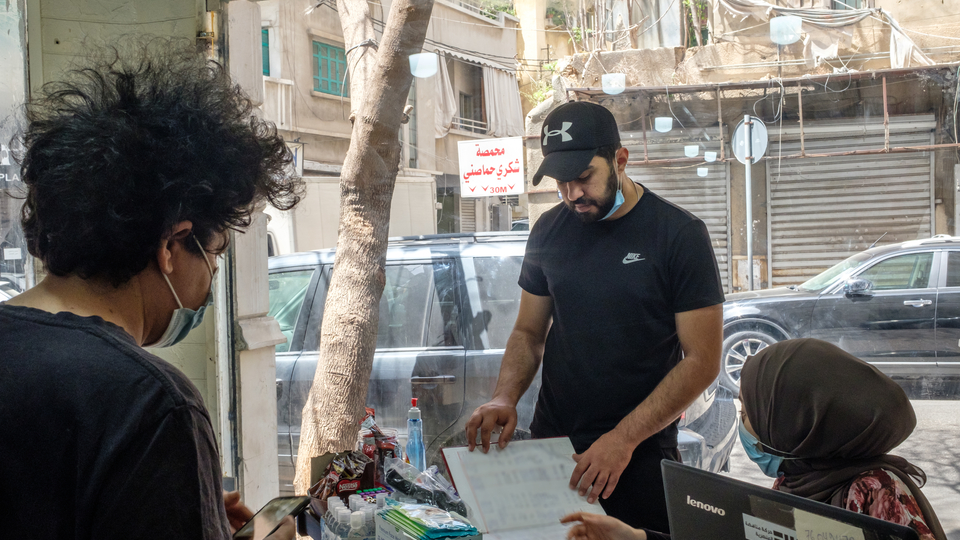
Mohamad, Nadine, and Nour look at their growing list of co-op members. April 30, 2021. (Rita Kabalan/The Public Source)
The cooperative sector — promising as it may be as a grassroots alternative to the market economy — faces structural obstacles. Impeding legal frameworks, significant funding gaps, and clientelist politicization stand in the way of actualizing the sector's potential on a greater scale. A 2020 policy paper by Triangle, a Beirut-based think tank, outlines some of these pitfalls.
Lebanon's legal framework for cooperatives was first introduced during the Chehab era (1958-1970), and granted cooperatives such benefits as exemptions on income tax, land tax, and various forms of stamp tax. The legal framework, however, is vague, not tailored to cooperatives acting within different sectors, and has not been amended since 1983, according to a 2018 International Labour Organization report.
In 2000, the co-operative sector took a blow when the Ministry of Housing and Cooperatives was dissolved. The General Directorate of Cooperatives was tossed into the Ministry of Agriculture which oversees cooperatives across sectors. The Ministry prioritizes agricultural cooperatives through policy and operations, which has left non-agricultural cooperatives with even less support than agricultural ones. Cooperatives are also bound by strict rules that lack sector-based regulations, which hinders their growth across sectors and geographic expansion.
Unclear processes within the already understaffed and underfunded Directorate has made the registration of emerging cooperatives, like the dikkeneh, difficult.
Impeding legal frameworks, significant funding gaps, and clientelist politicization stand in the way of actualizing the sector's potential on a greater scale.
The director general of cooperatives at the Ministry of Agriculture Gloria Abou Zeid is on a mission to dissolve inactive cooperatives, largely to mitigate abuses by the political class. The latter has used the co-op sector to receive tax breaks on for-profit and other projects with political and sectarian ends. Indeed, as al-Basta al-Tahta dikkeneh was launching, 300 cooperatives were being dissolved. Erring on the side of caution has had the unintended consequence of creating more hurdles in the way of registration.
The dikkeneh is not among the 875 registered cooperatives that remain in 2021. The founders could not yet finalize the registration because the process requires an unreasonable amount of documentation and a tedious socio-economic study.
Without this commercial license, the founders of the dikkeneh cannot access subsidized goods for their predominantly low-income customers.
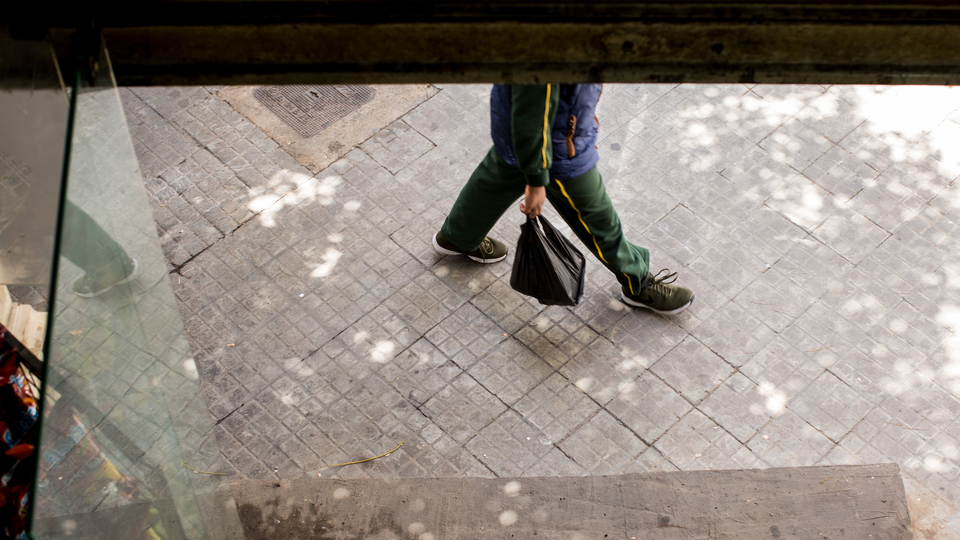
The co-op is open from 10 a.m. to 6 p.m. for patrons. April 16, 2021. (Rita Kabalan/The Public Source)
Consumer cooperatives, like the dikkeneh, are fewer than agricultural co-ops, not only because of a harder registration process, but also because of a network called “COOP” that is found in nearly every major city.
Contrary to what the name suggests, COOP is no longer a co-operatives network but a chain store. It was privatized in 2000 following a scandal in which somewhere between 6,000 and 23,000 shareholders, depositors, and creditors lost billions of Lebanese pounds to fraud and embezzlement. COOP then sucked into its network many consumer cooperatives, integrating them into the chain, according to a 2020 report by Daleel Tadamon.
Unsurprisingly, the chain stopped serving the interest of its members, Em Ali told The Public Source while getting some groceries. She now prefers to shop at the dikkeneh where she has been a member for several months.
“The prices are good; the quality of their products is very good; and the staff is friendly,” she said. “I feel like I’ve been saving a lot [by shopping here],” added Manal, another member of the dikkeneh.
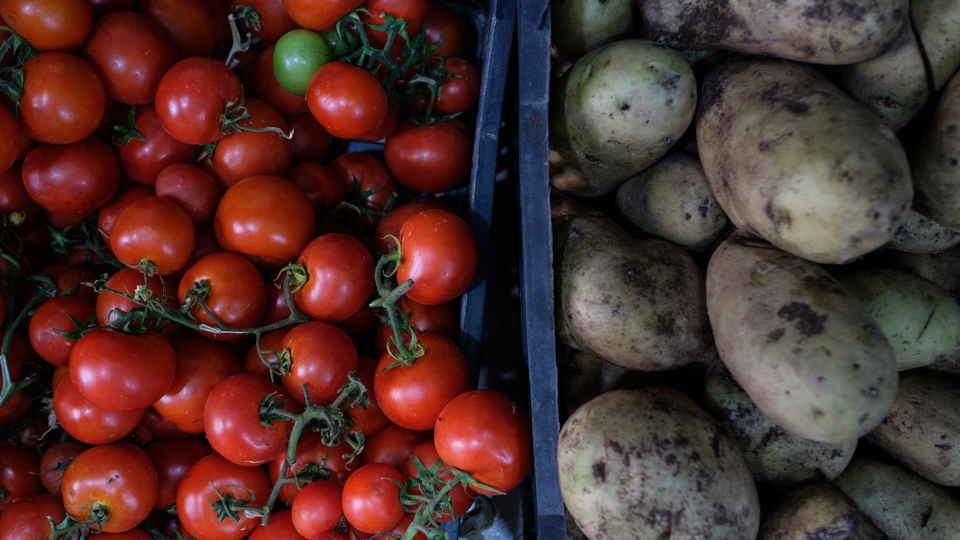
Vegetables are available for co-op members at a discounted price. April 16, 2021. (Rita Kabalan/The Public Source)
“Our customers really become family,” Katanji feels and it's obvious in the way the members interact with the shop keepers. As soon as Em Ali walked in, the two exchanged greetings and jokes as she inquired about the yogurt she had requested.
Katanji works hard to make sure that people who come into the store can "shop with dignity and leave happy, no matter their economic status." Speaking of their members, he says, "we want them to be our collaborators and participate in the decisions we make.”
Every week before going to wholesale retailers to stock up, he checks in with the dikkeneh's regulars about the products they need. It is a simple first step to engage the community in decision-making.
“Cooperative work is a discussion among stakeholders who look for their common interests and take decisions that benefit the majority,” Nadine Moawad believes. “There is a part of this work that is not just about the goods or the money; it’s about the democratic process where members decide how to run the store according to their best interests.”
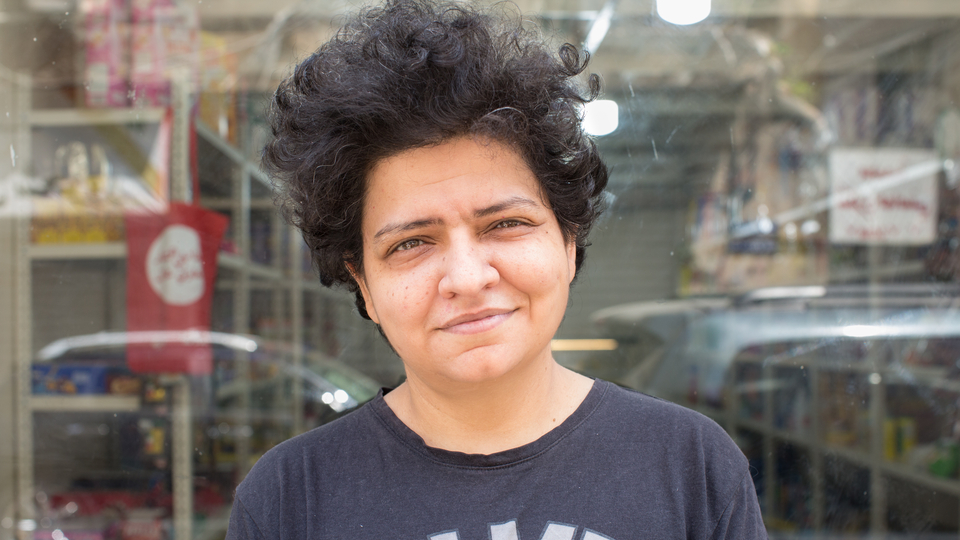
Nadine Moawad, one of the co-founders, believes in the community working together and supporting each other. April 30, 2021. (Rita Kabalan/The Public Source)
The membership program has so far been successful. It guarantees affordable goods for members and encourages them to take ownership of the project. Member dues are not yet enough to sustain the shop, so it relies on individual donations and sales revenue from non-members (who pay an extra 10 percent on products) to cover operation costs like rent and utilities.
The dikkeneh doesn’t make a profit and is still in its pilot stage, according to its founders. The stronger the membership base, the more likely it will become sustainable — and even expand elsewhere.
Half of all registered cooperatives are facing financial challenges, according to Daleel Tadamon, not least because of the fluctuating dollar rate, consumers’ low purchasing power, and the absence of policies supporting the co-op sector.
“There is a part of this work that is not just about the goods or the money; it’s about the democratic process where members decide how to run the store according to their best interests.” —Nadine Moawad, co-founder
This explains why a number of cooperatives have turned to grants and international donations to withstand the crisis. Dependence on foreign funds, however, undermines the autonomy of cooperatives and raises the question of sustainability.
The absence of centralized support and secure funding leaves cooperatives exposed to the abuse of commercial and sectarian-clientelistic actors, based on the reports of the former chairman of Lebanese Cooperatives Mounir Farghal. Sectarian parties and parliamentary candidates have co-opted the model for their own political gains, completely undermining the core principles of cooperatives: a bottom-up approach, open membership, and autonomy.
The dikkeneh co-op, despite its location in a highly politicized area, has maintained its independent status and avoided interacting with neighboring political groups. When customers inquire about the founders' political allegiance, they are met with a resounding proposition: “We are a cooperative grocery store here to help people.”
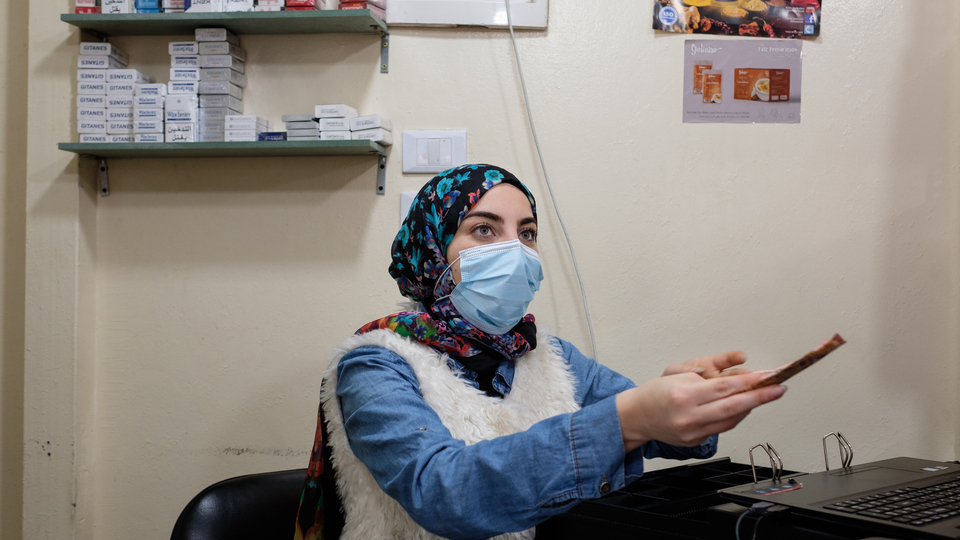
Nour, 26, works at the cash register and assists customers. She says that other store owners were frustrated at first when the co-op opened. April 16, 2021. (Rita Kabalan/The Public Source)
The team at the dikkeneh is currently documenting every step of their launch and operation. Mistakes, lessons learned, small victories, and member feedback will all be part of a “blueprint” they hope to write and share on their website to encourage and guide others to replicate the model.
The principles of grassroots organizing, open membership, mutual profitability, and genuine service are small but significant steps toward economic equality. Moawad's political vision for the dikkeneh is clear, “We want to stay away from the principles of charity," she said, adding that "we all benefit from this model; no one is doing good and neither is anyone receiving charity.”
“The idea is simple: if we all work together, we can provide better labor conditions, and we can have a decision and a choice.”
